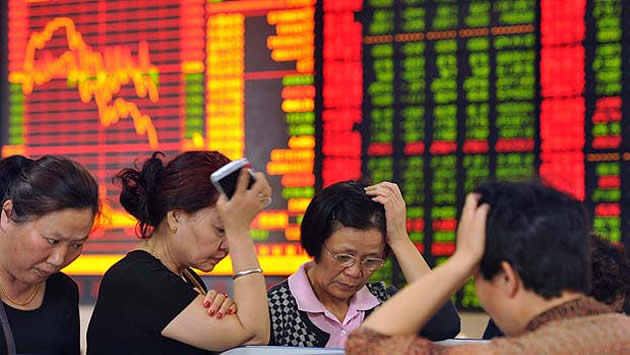China growth slows, global economy feels effects

 HONG KONG. — The commodities giant BHP Billiton spent heavily for years, mining iron ore across Australia, digging for copper in Chile, and pumping oil off the coast of Trinidad. The company could be confident in its direction as commodities orders surged from its biggest and best customer, China. Now, BHP is pulling back, faced with a Chinese economy with slowing growth that will no longer be the same dominant force in commodities. Profit is falling and the company is cutting its investment spending budget by more than two-thirds.
HONG KONG. — The commodities giant BHP Billiton spent heavily for years, mining iron ore across Australia, digging for copper in Chile, and pumping oil off the coast of Trinidad. The company could be confident in its direction as commodities orders surged from its biggest and best customer, China. Now, BHP is pulling back, faced with a Chinese economy with slowing growth that will no longer be the same dominant force in commodities. Profit is falling and the company is cutting its investment spending budget by more than two-thirds.
China’s rapid growth over the last decade reshaped the world economy, creating a powerful driver of corporate strategies, financial markets and geopolitical decisions. China seemed to have a one-way trajectory, momentum that would provide a steady source of profit and capital. But deepening economic fears about China, which culminated this week in a global market rout, are now forcing a broad rethinking of the conventional wisdom. Even as markets show signs of stabilising, the resulting shock waves could be lasting, by exposing a new reality that China is no longer a sure bet.
China, while still a large and pervasive presence in the global economy, is now exporting uncertainty around the world with the potential for choppier growth and volatile swings. The tectonic shift is forcing a gut check in industries that have built their strategies and plotted their profits around China’s very fast growth.
Industrial and commodity multinationals face the most pressing concerns, as they scramble to stem the profit slide from weaker consumption. Caterpillar cut back factory production, with sales of construction equipment in China dropping by half in the first six months of the year.
Smartphone makers, automobile manufacturers and retailers wonder about the staying power of Chinese buyers, even if it is not shaking their bottom line at this point. General Motors and Ford factories have been shipping fewer cars to Chinese dealerships this summer.
It is not just companies reassessing their assumptions. Russia had been turning to China to fill the financial gap left by low oil prices and Western sanctions. Venezuela, Ukraine, Nigeria, in fact most African countries have been heavily dependent on investments and low-cost loans from China.
The pain has been particularly acute for Brazil. The country is already faltering, as weaker Chinese imports of minerals and soybeans have jolted all of Latin America. The uncertainty over China could limit the manoeuvring room for officials to address the sluggish Brazilian economy at a time when resentment is festering over proposed austerity measures.
The weakness in China is even compelling officials at the United States Federal Reserve to think more globally, as they consider raising interest rates. William C. Dudley, the president of the New York Fed, said on Wednesday that a September rate increase looked less likely than it did a few weeks ago.
“The entire world is focusing now on China, watching this crisis unfold,” Armando Monteiro Neto, Brazil’s minister of development and foreign trade, told reporters on Tuesday in Brasília. “Brazil is already feeling the effects of China’s deceleration. If the situation gets worse, the impact will get bigger.”
The trouble is, the true strength of the Chinese economy — and the policies the leadership will adopt to address any weaknesses — is becoming more difficult to discern. China’s growth, which the government puts at 7 percent a year, is widely questioned. Large parts of the Chinese service sector, like restaurants and health care, continue to grow, supporting the broader economy.
But the signs in industrial sectors, in which other countries and foreign companies have the greatest stake through trade, paint a bleaker picture. Now, the industry is retrenching in the face of China’s weaker prospects and diving commodity prices. Vale, the Brazilian mining giant, is racing to unload assets. In Australia, Vale and its Japanese partner, the Sumitomo Corporation, sold a coal mine in July for just $1, after it had been valued at more than $600 million three years ago. In Argentina, Vale is trying to sell a potash mine in which it invested more than $2 billion.
The fallout in commodities has been especially painful for emerging markets that depend on sales of those resources. — NY Times.










Comments